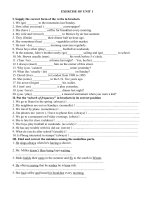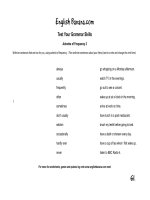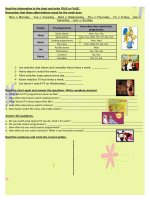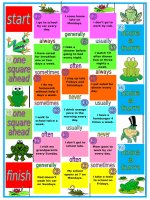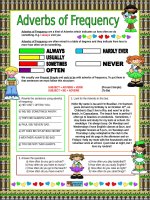Adverbs Of Frequency
Bạn đang xem bản rút gọn của tài liệu. Xem và tải ngay bản đầy đủ của tài liệu tại đây (102.75 KB, 2 trang )
ADVERBS OF FREQUENCY
(UNIT 2 – ENGLISH 10)
1. An adverb of frequency usually goes in mid position.
- The bus doesn't usually stop here. I can never open these packets.
- It's always cold up here. I often get up in the night.
Some adverbs of frequency are always; normally, generally, usually; often, frequently; sometimes,
occasionally; seldom, rarely; never.
NOTE
a. The adverb can sometimes go after the subject and before a negative auxiliary. Compare these sentences.
- I don't often have breakfast. (= I seldom have breakfast.)
- I often don't have breakfast. (= I often go without breakfast.)
- Sometimes goes before a negative auxiliary.
- You sometimes can't get a table here.
b. Seldom and rarely are a little formal. In informal speech we use not often.
- I don't often play cards.
- c Never is a negative word. • 17(4)
- I've never felt so embarrassed in my life. Will you never learn?
We use ever mainly in questions.
- Have you ever done any ballroom dancing? ~ No, never.
But we can also use ever with negative words.
- I haven't ever felt so embarrassed.
- You hardly ever buy me flowers.
- Ever can add emphasis to the negative.
- No one ever said that to me before.
- Nothing ever happens in this place.
- I never ever want to see that awful man again.
We can also use ever in conditions and comparisons.
- If you ever feel like a chat, just drop in.
- James swam faster than he'd ever done before.
- If ever can go before the subject.
- If ever you feel like a chat, just drop in.
We do not normally use ever in positive statements.
- I always have lots to do. NOT I ever have lots to do.
2. Normally, generally, usually, frequently, sometimes and occasionally also go in front or end position.
- Normally I tip taxi-drivers. My sister comes to see me sometimes.
Often, seldom and rarely can go in end position, especially with e.g. very or quite.
Doctors get called out at night quite often.
A lot (= often) goes in end position.
We go out a lot at weekends.
NOTE
a. Always, never and often in front position are emphatic.
- Always the ghost appeared at the same time.
We can use always and never in instructions.
- Never try to adjust the machine while it is switched on.
b. For never, seldom and rarely with inversion.
3. We can also use a phrase with every, most or some to express frequency. These phrases can go in front or
end position.
- Every summer we all go sailing together.
Bảo Thoa 1
- The dog has to have a walk every day.
- The postman calls most days.
- Some evenings we don't have the television on at all.
We can also use once, twice, three times etc.
- The committee meets once a month.
- Two tablets to be taken three times a day.
- Paul has been married several times.
NOTE
Compare often and several times.
- We've often been skiing. (= many times over a long period)
- We've been skiing several times. (= perhaps four or five times)
4. The adverbs daily (= every day), weekly etc go in end position.
- Are you paid weekly or monthly?
INVERSION OF THE VERB AFTER CERTAIN ADVERBS
Certain adverbs and adverb phrases, mostly with a restrictive or negative sense, can for emphasis be placed first
in a sentence or clause and are then followed by the inverted (i.e. interrogative) form of the verb. The most
important of these are shown below. The numbers indicate paragraphs where an example will be found.
hardly ever, on no account, hardly . . . when, only by, in no circumstances, only in this way, neither/nor, only
then/when,
never, scarcely ever, no sooner . . . than, scarcely . . . when, not only, seldom, not till, so, nowhere
e.g.
- I haven't got a ticket. ~ Neither/Nor have I.
- I had never before been asked to accept a bribe. Never before had I been asked to accept a bribe.
- They not only rob you, they smash everything too. Not only do they rob you, they smash everything too.
- He didn 't realize that he had lost it till he got home. Not till he got home did he realize that he had lost
it.
- This switch must not be touched on any account. On no account must this switch be touched.
- He was able to make himself heard only by shouting. Only by shouting was he able to make himself
heard.
- He became so suspicious that. . . So suspicious did he become that. . .
Note also that a second negative verb in a sentence can sometimes be expressed by nor with inversion:
e.g.
- He had no money and didn't know anyone he could borrow from.
- He had no money, nor did he know anyone he could borrow from.
(neither would be less usual here.)
Bảo Thoa 2

